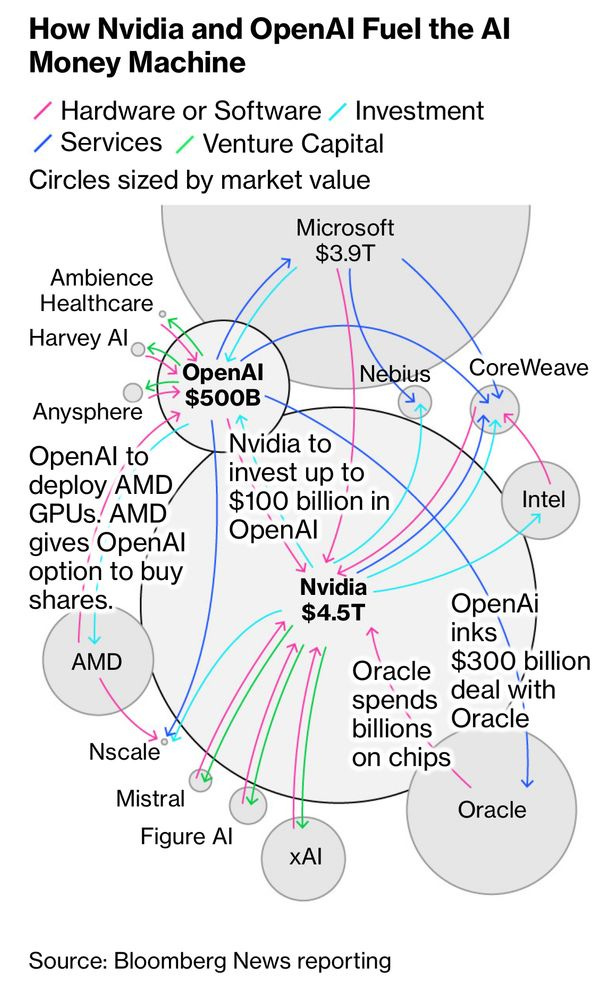For and To
Cory Doctorow | Cui Bono? | AI Shell Game | Factoids
Luddism and science fiction concern themselves with the same questions: not merely what the technology does, but who it does it for and who it does it to.
| Cory Doctorow
…
Cui Bono?
Doctorow is adapting the concept of cui bono — who benefits — as a mechanism to draw an analogy between science fiction — he’s a science fiction writer — and the political philosophy of Luddism, or its present-day manifestation: neo-Luddism.
An obvious target for neo-Luddite sentiment is the terrifying rise of AI investment, which is inevitably targeting labor costs in business. The payout that these investors are expecting has to represent tens or hundreds of millions of workers being let go, or work atomized into cascades of tasks, with as many of those tasks as possible being handed over to AI surrogates.
I firmly believe that the recent hardening of CEO’s attitudes about their treatment of the workforce is the other side of this projection: as AI grows in capability, the ‘jobs’ that workers have will be fractured, and only the tasks that AI will be unable to do will be directed to people. This will, in parallel, push more people into gig work, as the range of their work is eroded.
This, I believe, is the plan shared by the managerial class, the investors, and those companies diverting vast sums toward its realization.
The AI revolution may enable a top-to-bottom realignment of work, with a significant portion of workers being disconnected from traditional employment. It’s true that to date, AI has not upended most work, and it may be five years or more before the implicit scheme to undo the contemporary notion of knowledge work comes together. But, be warned: that is the plan.
Just remember: who benefits?
In upcoming installments, I will try to address how to resist this scheme.
The AI Shell Game
As reported yesterday by Emily Forgash and Agnee Ghosh, OpenAI and Nvidia are two key players of AI-involved companies making deals in a massive circular network:
Two weeks ago, Nvidia Corp. agreed to invest as much as $100 billion in OpenAI to help the leading AI startup fund a data-center buildout so massive it could power a major city. OpenAI in turn committed to filling those sites with millions of Nvidia chips. The arrangement was promptly criticized for its “circular” nature.
This week, undeterred, OpenAI struck a similar deal. The ChatGPT maker on Monday inked a partnership with Nvidia rival Advanced Micro Devices Inc. to deploy tens of billions of dollars’ worth of its chips. As part of the tie-up, OpenAI is poised to become one of AMD’s largest shareholders.
Never before has so much money been spent so rapidly on a technology that, for all its potential, remains largely unproven as an avenue for profit-making. And often, these investments can be traced back to two leading firms: Nvidia and OpenAI. The recent wave of deals and partnerships involving the two are escalating concerns that an increasingly complex and interconnected web of business transactions is artificially propping up the trillion-dollar AI boom. At stake is virtually every corner of the economy, with the hype and buildout of AI infrastructure rippling across markets, from debt and equity to real estate and energy.
As a glaring example, the chipmaker Nvidia will invest up to $100 billion in OpenAI, which in turn announced a $300 billion deal with Oracle to build data centers. Oracle will then turn to Nvidia to supply the chips for those facilities.
In earlier boom/busts, like railroads in the 1800s, and the dot-com crash, massive amounts were thrown into the furnaces. However, railroads ultimately revolutionized transportation, and the dot-com bubble was the direct precursor to today’s social media and the rise of the internet. So even if there is an AI bust in the near-term, it doesn’t mean there won’t be an AI-dominated economy in the future.
I’m reminded of a line from Akira, by Katsuhiro Otomo:
There ought to be a future we can choose. It’s up to us to find it.
In the near term, the AI boom may be a shell game, where there may not be a pea under any of the shells being pushed around.
But we should have a say in the economic order of our shared future, and not just become NPCs performing the minimal tasks allowed us, while the owners of the machines create the rules and constrain us to follow them.
Factoids
More Data Centers Than Offices
Lydia DePillis reports that


